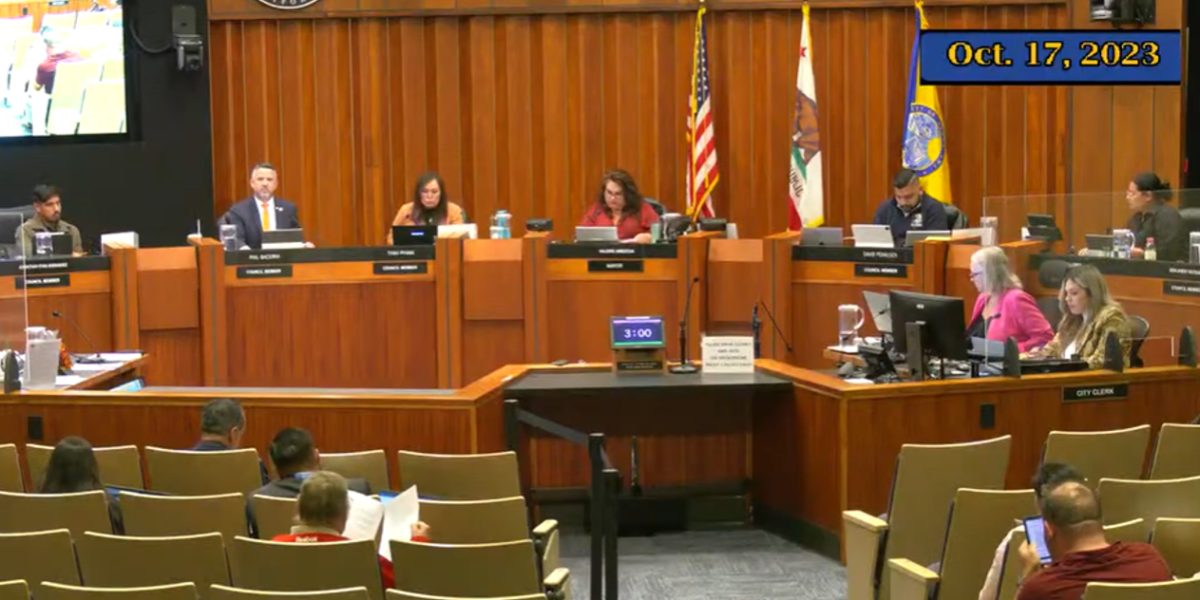Overriding objections that it is unfeasible and undermines the idea of being an American citizen, the Santa Ana City Council’s progressive majority voted to place the city on a path to allow non-citizens to vote in city council elections.
Mayor Pro Tem Jessie Lopez and Councilmembers Thai Phan, Ben Vasquez and Johnathan Hernandez approved taking the first step in giving the vote to non-citizens by placing a measure on the November 2024 asking Santa Ana voters if they support amending the city charter to allow non-Americans to vote for mayor and city council.
As originally agendized, the issue was to be an advisory measure on the November 2024 ballot, asking Santa Ana voters to vote “yes” or “no” on the question: “Do the People of the City of Santa Ana approve noncitizens voting in the City of Santa Ana municipal elections at which municipal officers are elected?”
However, Phan led an effort to make it a charter amendment, in hopes that if it passed, non-Americans could vote in city elections beginning in 2026.
Mayor Valerie Amezcua and Councilmembers David Penaloza and Phil Bacerra were vocally opposed to the idea, characterizing it as half-baked political pandering that could harm non-citizens efforts to gain American citizenship.
Penaloza noted the council majority had no answers to questions about how to implement non-citizen voting.
“Who is going to run these elections?,” asked Penaloz, noting the city attorney had previously advised them the OC Registar of Voters does not want to oversee them.
“I can assure you that the county Registrar of Voters is not going to run these elections. Who is going to register people to vote? I can guarantee you that the county will not. Do we have to create our own elections department and hire own elections officer? Is this limited to permanent residents? Or is it absolutely anyone who calls Santa Ana home? Who’s gonna prepare and fill out these ballots?”
“Those are great questions that our city attorney doesn’t have the answers to,” commented Mayor Amezcua. “Not that she’s doesn’t know her stuff – she’s a great city attorney – but she can’t even answer whose gonna be responsible for [non-citizen voting]. The Registrar of Voters? We don’t even know that.”
Penaloza noted the language of the state Constitution limits the vote to adult American citizens .
“All of us here took the same oath to protect and defend the Constitution of the United States and the constitution of the State of California,” said Councilman Penaloza. “And the constitution of the State of California, Article 2, Section 2a, clearly states ‘A United States citizen 18 years of age and resident in this State may vote.”
“I’m not supportive of this [allowing non-citizens to vote] because there are a thousand questions that are not answered – that our own city staff cannot answer – that nobody knows how this is gonna work,” said Penaloza.
“As we saw with the [rent control ordinance], how wasteful it’s been with these [rental registry] letters, not even knowing who they’re going to – I can only imagine how these ballots [for non-citizens] are going to roll out,” said Penaloza.
Councilwoman Phan brushed aside assertions that giving the vote to non-citizens would jeopardize applications by legal immigrants to become American citizens. The N-400 form they must complete asks if they have voted in elections in the U.S., and a “yes” answer could imperil approval of their application.
“The evidence that we have, that is not an issue,” said Phan.
Contrary to Phan’s assertion, even advocates for noncitizen voting in Santa Ana admit it would cause problems for legal immigrations going through the naturalization process.
At a recent ‘town hall” organized by Santa Ana Families for Fair Elections (SAFFE), a presenter introduced as “Jennifer” admitted as much. SAFFE is a coalition of left-wing interest groups that advocate for de facto open borders.
“The issue that really pops up is one of the questions [on the N-400]. It asks “Have you ever registered to vote in a federal, state or local election?” And if you do choose to vote in a local election, you must answer “yes.” And so that does pose some issues. It may hold your application and also may put you through secondary review which would prolong your application process.”
Jennifer and other advocates claim this can be overcome by giving non-citizen voters an letter certifying they were allowed to vote in Santa Ana elections – as San Francisco does.
That may or may not work, but as Mayor Amezcua noted, immigration rules can change with Administrations, and 2024 is a presidential election year.
“And I don’t know who’s going to be president and things are going to change if we get a new president. And we’re going to be sitting here saying, ‘Oh, now people are being told they can’t be citizens because you voted. You voted in an election when you shouldn’t have voted.’” said Amezcua.
Councilman Ben Vasquez minimized abandoning the principle that voting should be a privilege of American citizenship.
“Non-citizen voting has been around for a while,” said Vasquez, a reference to a few decades in the late 19th Century and early 20th Century – a period of mass European immigration when urban political machines exploited recent immigrants to dominate elections – when non-citizen voting was permitted in in some jurisdictions.
“It’s not a wild idea,” said Vasquez.
Mayor Pro Tem Jessie Lopez, a left-wing activist who is facing a recall election next month in one of the more conservative council districts, had little to say on the topic.
“I’m fine giving this to the voters to decide, and I’m supportive your comments, Councilmember Phan.”
It was Phan who pushed to go beyond a simple advisory vote and instead ask the voters to amend the city charter to permit non-citizen voting in city elections.
Phan served up various justifications for her support for non-citizen voting.
“It’s important to make sure our residents feel heard,” a talking point heavily used by the progressive groups pushing for noncitizen voting.
Phan also said Santa Ana should give the vote to foreign citizens because during the pandemic, the city pushed to have everyone, including illegal immigrants, get vaccinated against COVID-19 – comparing a public health measure to eliminating a central distinction between citizens and non-citizens.
She also conflated it with the move to electing the city council by districts, and basically said that voters could only authentically “heard” when they are represented by someone of the same race or ethnicity, and that the city’s Vietnamese-American voters were de facto disenfranchised until she, a Vietnamese-American, was elected.
“As the first Vietnamese-American councilmember elected in this city, we had to have a lawsuit to sue the city so that Vietnamese American residents felt like they had a voice, to elect a person to represent their interests. There are over 30,000 Vietnamese Americans who had lived here for decades and had never had their voices heard.”
From that fragmented, specious and race-based argument, Phan claimed it logically followed that Santa Ana should an intrinsic, signature element of citizenship and award it to non-citizens – as long as they had taken up residence in the city at least 30 days before an election.
Jessie Lopez said she was “supportive” of all that.
As proposed by Phan and supported by Lopez, Vasquez and Hernandez, a foreign citizen could arrive in Santa Ana a mere 30 days before election, register to vote and cast a ballot for mayor, city council and any municipal ballot measures.


